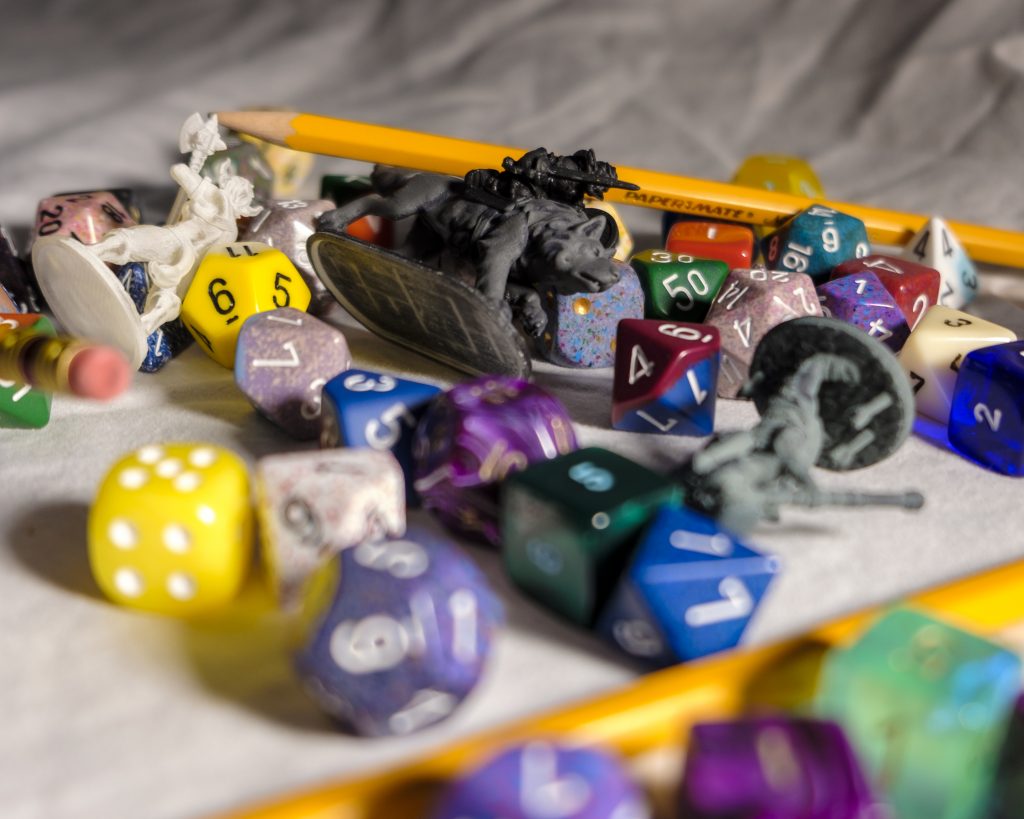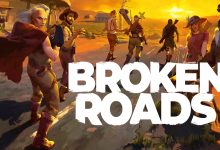The acronym TTRPG stands for “Tabletop Role Playing Game“. Tabletop RPG is a tabletop (board or paper and pencil) game whose material is mostly imagination. In other words; improvisational verbal theater, improvisational story writing/telling, or house/cowboy play.
Tabletop RPG is a deepened version of the imagination-based games we played as children, with fixed rules. So the players can’t be spoiled. What makes Tabletop RPG an adult game, not a child’s game, is that it has detailed rule sets. There is a storyteller. This person is called the “Dungeon Master”. This person basically does the job of an artificial intelligence in a computer game. That is, he shapes everything about the universe the players are in. The players, in turn, tell how their characters in the story will react to events.

A rule set is chosen to fit the universe in which the game takes place. There are rule sets for all kinds of universes. For example, the “Dungeons and Dragons” set is ideal for a magical period set in medieval times. In this ruleset, there are limits to the characters the player can become, the types of creatures they can encounter, weapons that can be purchased, spells that can be learned, etc.
For example, a knight can never lie, do evil or turn a blind eye to evil. Also, as a knight progresses through the adventure, he gains not only weapon skills but also powers from his god, and a very powerful knight can also perform the miracles of his god. What these are, their levels, their powers, their damage, their effects are covered in pages and pages of books. There is also a dice system to add the element of luck to the game. There are a wide variety of dice: 4-sided, 6-sided, 8-sided, 10-sided, 20-sided. The dice are used as follows: if your character has a “Muscle Strength” of 16 – which is determined by the dice at the very beginning of the game – he gets +3 to the dice he rolls when he uses strength ([Stat – 10]/2, in this case (16-10)/2=3). This means that for the Dungeon Master to open a heavy hatch with an opening difficulty of 15, he will need to roll at least 12 on a 20-sided die, and since he can reach the limit of 15 with the +3, the hatch will open to the player. Don’t be intimidated by this pile of rules, a player just says what he wants to do, the Dungeon Master takes care of everything else. A player only needs to know the limitations of the character they are playing; it would be a shame if they were playing a warrior and said they were going to cast spells. In Tabletop RPG, you can play a doctor in World War II, or a robot in the year 3000, or a time cop, or a vampire if you want; in short, imagination is the upper limit.

What is Tabletop RPG?
Role Playing Games, also called Tabletop RPG, is a Fantasy Role Playing Game. The aim of the game is to have fun at first. Next is role playing. Do not confuse the game with a Diablo. This is not a game where you go out into the meadow and slaughter orcs… Players have the freedom to do anything they want, to think anything. provided that they do not exceed the capacity and personality of the character they play.
For example, a Barbarian cannot cast Fireball, and a Wizard cannot use the Great Sword. And of course the character’s personality, for example, a paladin (guardians of goodness, knights) will never make a deal with a goblin, even if he sees a goblin, he will draw his sword (paladins are bold and brave, they do not hesitate to sacrifice their lives for their duty) and attack, no matter how many there are in the goblin group. A rogue (especially if he is a halfling, which is one of my favorite classes) will even have dinner with goblins for free (often funny things happen to halfling/rogue characters, a rogue is essential to have a lot more fun in the game)! The examples go on and on, but you get the idea. Anyway, I will explain the personality traits of all classes (classes – for example, the rogue class above is a rogue class) when I get to that part.
How to play this game?
You need at least 2 people to play this game.
1) DM: Let’s open it right away. DM stands for Dungeon Master. The DM’s job is to manage the game by sticking to the script. But there is a very important point, which is not to stick to the script too much. It is always better to play a game without restricting the players. For this, the DM needs to have some improvisational skills.

What I mean by DMing the game is playing the characters that the players will encounter in the game (that is, the DM takes their role), rolling the dice of the enemies while fighting them (I will explain the dice rolling system below), and determining the damage the characters take (you will take certain damage in battle, and the effects of some spells will reduce your attributes, for example, if a spell reduces your strength attribute, the amount of damage you will deal to the enemy with your weapon will decrease. Spell effects are not permanent, in fact they are very short-lived. There are some that last for a very long time. Anyway, let’s get back to the point) the character writes it down on his/her paper and calculates the damage dealt to the enemies and writes it down. Calculations can sometimes take a very long time. That’s why you may need a calculator. It would be great if someone could help the DM with the calculations. A player can help the DM with this. The action of the game will not decrease (games with at least 1 person are not good, 3 people are acceptable).
2) Player: The more players the better. But it should not be too many. Too many players can turn the DM’s head into soup. 3 or 4 players are the best. The role of the players is to act.
The players first choose the character they want to play. This character is available in the script. They must choose one of these characters. Even if the players want to play a character of their own creation, they have to decide with the gamemaster to create characters that fit the scenario. Their abilities and traits will be set by the player, of course, but having the character’s backstory written by the DM (or in the box if you buy a campaign pack, there are characters in the box) can lead to surprise events in the scenario, for example, there is a thief who escaped from prison and his best friend helped him get there. The scene where he meets him is a great contribution to the game’s scenario. The character writes this backstory and gives it to the DM and the DM fits it into the scenario, but a scenario that has been completely edited from the beginning is always good. I mean, the game has to end somewhere, players shouldn’t just wander around slaughtering orcs after a while.

At the same time, players shouldn’t just go wherever they want on the map. The DM will make things up for this, which I think is usually not a problem if the players have a quest, since the players will walk the path the quest indicates. Now that we’ve covered the basics of the game, let’s take a look at what you need to play the game before moving on to the basic rules.
What Do I Need to Start the Game?
- Dice – 1d3,1d4,1d6,1d8,1d10,1d12,1d20. 1d100 and 1d3 are not necessary but would be nice. The price is around 10$.
- Player’s Handbook – The Player’s Handbook contains many rules, but not all rules. You can play very high quality games only with this book. If you say you can’t find it, read here. At least you learn enough to play Tabletop RPG. But this book is a very good resource.
- Starter Set – If you want to start Tabletop RPG, this is the set you need. It has all the necessary dice and simple rules. But let me say from the beginning that it is very simple and it is a product that is only intended to show what Tabletop RPG is. So don’t think that you will get this set and play incredible games. But it works.
- Character Sheets – No need to pay for them when you can print them here using the printer. They are also in the back pages of the Player’s Handbook. You can also photocopy them and play with them (Don’t “freak out” after downloading and seeing the character sheets).
- Campaign or Any Scenario Pack – You need a written scenario to play this game. You can buy them, or you can make your own. But it won’t be very professional. Campaign Packs are the best, they contain very high quality scripts. After all, they are made by competent people. I can’t say anything since their prices vary. You can find various scenarios here.
- Manuscript papers – These shouldn’t be hard to find (:D). The papers you will take notes while playing the game. Keep them ready from the beginning.
- And a DM with a good imagination and actors who can act well…






